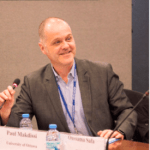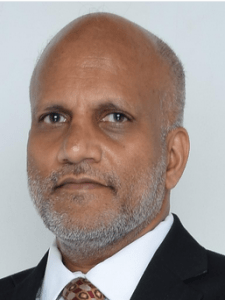Behavioral contagion refers to how ideas and behaviors often spread in ways that resemble the spread of infectious disease. Exposure to others infected by a virus, for example, makes people more likely to become infected, just as people are more likely to drink excessively when they spend more time with heavy drinkers. But there are also important differences between the two types of contagion. One is the effect of visibility. Solar panels that are visible from the street, for instance, are more likely to stimulate neighboring installations. In contrast, we try to avoid others who are visibly ill. Another difference is that viral contagion is almost always a bad thing, but behavioral contagion can be either negative—as with smoking—or positive, as with solar installations. The seminar will discuss the policy choices we face when individually rational behavior is collectively irrational, as often happens under both types of contagion.
This webinar was moderated by IIEP Co-Director James Foster, with introductory remarks by IIEP Distinguished Visiting Scholar Sunil Sharma and welcome remarks by Ann Florini of ASU-Thunderbird. This event was co-sponsored by the Thunderbird School of Management, Arizona State University, and the Institute for International Economic Policy at GWU.
Meet the Presenter:
 Robert H. Frank (@econnaturalist) is the HJ Louis Professor of Management and Professor of Economics, Emeritus, at Cornell’s Johnson School of Management. His “Economic View” column has appeared in The New York Times since 2005. He received his B.S. in mathematics from Georgia Tech, then taught math and science for two years as a Peace Corps Volunteer in rural Nepal. He holds an M.A. in statistics and a Ph.D. in economics, both from the University of California at Berkeley.
Robert H. Frank (@econnaturalist) is the HJ Louis Professor of Management and Professor of Economics, Emeritus, at Cornell’s Johnson School of Management. His “Economic View” column has appeared in The New York Times since 2005. He received his B.S. in mathematics from Georgia Tech, then taught math and science for two years as a Peace Corps Volunteer in rural Nepal. He holds an M.A. in statistics and a Ph.D. in economics, both from the University of California at Berkeley.
His books, which include Choosing the Right Pond, Passions Within Reason, Microeconomics and Behavior, Principles of Economics (with Ben Bernanke), Luxury Fever, What Price the Moral High Ground?, Falling Behind, The Economic Naturalist, The Darwin Economy, Success and Luck, and Under the Influence have been translated into 24 languages. The Winner-Take-All Society, co-authored with Philip Cook, received a Critic’s Choice Award, was named a Notable Book of the Year by The New York Times, and was included in Business Week‘s list of the ten best books of 1995. He received the 2004 Leontief Prize for Advancing the Frontiers of Economic Thought, the Johnson School’s Stephen Russell Distinguished teaching award in 2004, 2010, 2012, and 2017, and its Apple Distinguished Teaching Award in 2005.
Meet the Discussant:
 Dr. Roland Kupers is an advisor on Complexity, Resilience and Energy Transition, a Professor of Practice at the Thunderbird School of Global Management, Arizona State University, and a fellow at the Institute for Advanced Studies at the University of Amsterdam.
Dr. Roland Kupers is an advisor on Complexity, Resilience and Energy Transition, a Professor of Practice at the Thunderbird School of Global Management, Arizona State University, and a fellow at the Institute for Advanced Studies at the University of Amsterdam.
A theoretical physicist by training, Roland spent a decade at AT&T and then a decade at Royal Dutch Shell in various senior executive functions, including Vice President for Sustainable Development and Vice President Global LNG, where he was integrally involved with strategy and scenario planning.
His numerous publications include most recently his pathbreaking book on A Climate Policy Revolution: What the Science of Complexity Reveals about Saving Our Planet (Harvard University Press, 2020). His previous works include such co-authored books as The Essence of Scenarios (Amsterdam University Press, 2014) and Complexity and the Art of Public Policy (Princeton University Press 2014), along with an edited volume: Turbulence: A Corporate Perspective on Collaborating for Resilience (Amsterdam University Press, 2014) and articles in Harvard Business Review and in Project Syndicate.
Meet the moderator:
 Sunil Sharma is a Distinguished Visiting Scholar at the Institute for International Economic Policy, Elliott School of International Affairs, The George Washington University, Washington, D.C., USA, and a Senior Associate at the Council on Economic Policies, Zurich, Switzerland. He was Assistant Director in the IMF’s Research Department from 2015-2018, and the Director of the IMF- Singapore Regional Training Institute (STI) in Singapore from 2006-2015. Before moving to Singapore in 2006, he was Chief of the IMF Institute’s Asian Division in Washington, D.C. Prior to joining the IMF in 1992, Dr. Sharma was on the Economics faculty at the University of California, Los Angeles (UCLA). He has a Ph.D. and M.A. in Economics from Cornell University, a M.A. from the Delhi School of Economics, and a B.A. (Honors) from St. Stephen’s College, Delhi University. His current interests include rethinking capitalism and democracy, systemic hazards, complex systems, the international financial architecture, and the institutional structure and design of financial regulation.
Sunil Sharma is a Distinguished Visiting Scholar at the Institute for International Economic Policy, Elliott School of International Affairs, The George Washington University, Washington, D.C., USA, and a Senior Associate at the Council on Economic Policies, Zurich, Switzerland. He was Assistant Director in the IMF’s Research Department from 2015-2018, and the Director of the IMF- Singapore Regional Training Institute (STI) in Singapore from 2006-2015. Before moving to Singapore in 2006, he was Chief of the IMF Institute’s Asian Division in Washington, D.C. Prior to joining the IMF in 1992, Dr. Sharma was on the Economics faculty at the University of California, Los Angeles (UCLA). He has a Ph.D. and M.A. in Economics from Cornell University, a M.A. from the Delhi School of Economics, and a B.A. (Honors) from St. Stephen’s College, Delhi University. His current interests include rethinking capitalism and democracy, systemic hazards, complex systems, the international financial architecture, and the institutional structure and design of financial regulation.
Welcome Remarks by:
 Ann Florini is Clinical Professor at the Thunderbird School of Global Management, Arizona State University, where she directs programs at the Washington, D.C. campus. She was previously Professor of Public Policy at Singapore Management University founding director of the Centre on Asia and Globalisation at the National University of Singapore; and a Senior Fellow at the Brookings Institution. She has spearheaded numerous international initiatives on global governance, energy and climate policy, and cross-sector collaborations including government, civil society, and the private sector. Her many books and articles have addressed governance in China, transparency in governance, transnational civil society networks, and the role of the private sector in public affairs. Dr. Florini received her Ph.D. in Political Science from UCLA and a Masters in Public Affairs from Princeton University.
Ann Florini is Clinical Professor at the Thunderbird School of Global Management, Arizona State University, where she directs programs at the Washington, D.C. campus. She was previously Professor of Public Policy at Singapore Management University founding director of the Centre on Asia and Globalisation at the National University of Singapore; and a Senior Fellow at the Brookings Institution. She has spearheaded numerous international initiatives on global governance, energy and climate policy, and cross-sector collaborations including government, civil society, and the private sector. Her many books and articles have addressed governance in China, transparency in governance, transnational civil society networks, and the role of the private sector in public affairs. Dr. Florini received her Ph.D. in Political Science from UCLA and a Masters in Public Affairs from Princeton University.
 James E. Foster is the Oliver T. Carr, Jr. Professor of International Affairs, Professor of Economics, and Co-Director of the Institute for International Economic Policy at the George Washington University. He is also a Research Associate at the Oxford Poverty and Human Development Initiative at Oxford University. Professor Foster’s research focuses on welfare economics — using economic tools to evaluate and enhance the wellbeing of people. His work underlies many well-known social indices including the global Multidimensional Poverty Index (MPI) published annually by the UNDP in the Human Development Report, dozens of national MPIs used to guide domestic policy against poverty, the Women’s Empowerment in Agriculture Index (WEAI) at USAID, the Gross National Happiness Index of Bhutan, the Better Jobs Index of the InterAmerican Development Bank, and the Statistical Performance Index of the World Bank. Prof. Foster received his PhD in Economics from Cornell University and has a Doctorate Honoris Causa from Universidad Autonoma del Estado Hidalgo (Mexico).
James E. Foster is the Oliver T. Carr, Jr. Professor of International Affairs, Professor of Economics, and Co-Director of the Institute for International Economic Policy at the George Washington University. He is also a Research Associate at the Oxford Poverty and Human Development Initiative at Oxford University. Professor Foster’s research focuses on welfare economics — using economic tools to evaluate and enhance the wellbeing of people. His work underlies many well-known social indices including the global Multidimensional Poverty Index (MPI) published annually by the UNDP in the Human Development Report, dozens of national MPIs used to guide domestic policy against poverty, the Women’s Empowerment in Agriculture Index (WEAI) at USAID, the Gross National Happiness Index of Bhutan, the Better Jobs Index of the InterAmerican Development Bank, and the Statistical Performance Index of the World Bank. Prof. Foster received his PhD in Economics from Cornell University and has a Doctorate Honoris Causa from Universidad Autonoma del Estado Hidalgo (Mexico).
IIEP Rethinking Capitalism and Democracy Series
The COVID-19 pandemic, like the global financial crisis a decade ago, has laid bare the cracks in the leading capitalist democracies. Fissures in the political, social, economic, and financial orders, accompanied by an increasingly stressed natural environment, pose serious and possibly existential threats to these societies, as exploding income and wealth inequality subverts the integrity and fairness of markets and elections, weak regulatory oversight increases the likelihood and severity of the next crash, and the visible effects of climate change threaten lives and livelihoods and drive migrations. The three spheres of well-being – political and social, economic and financial, and the natural environment, are each becoming more fragile while their complex interrelationships are producing wicked challenges. The IIEP webinar series on Rethinking Capitalism and Democracy examines these difficult questions and possible policy responses.
Thunderbird Finance and Sustainability Series
The global financial system is facing new pressures to become “sustainable” – not only financially stable, but simultaneously environmentally friendly and socially inclusive. These pressures are partly political, in reaction to the increasing financialization of the global economy and the sector’s failure to steer investment to meet the needs of society. New financial technologies (“fintech”) pose yet more pressures on incumbent financial institutions but also offer great opportunities for the creation of what some are calling “citizen-centric” finance. Top public authorities are convening in the new Network of Central Banks and Supervisors for Greening the Financial System. The private sector has already moved rapidly from CSR to considering broader forms of ESG (environmental, social, governance) risks and opportunities in investments. Thunderbird’s Finance and Sustainability webinar series explores these urgent questions with leading practitioners and thinkers.
 Putu Natih supports the OPHI Outreach team and is also a lecturer at the Faculty of Economics and Business, Universitas Indonesia (FEB UI), where she teaches Econometrics for undergraduate and postgraduate students. Putu is also currently supporting Indonesia’s Coordinating Ministry for Human Development and Culture, as a social protection specialist. Before OPHI and FEB UI, Putu was a Statistics Tutor at Keble and St John’s Colleges at the University of Oxford. She also worked as a Research Assistant at the Blavatnik School of Government within a project on digital inequality. Putu completed her undergraduate degree at the Faculty of Economics, Universitas Indonesia and was a Jardine-Oxford Scholar at Trinity College, the University of Oxford, where she studied for her MPhil and DPhil.
Putu Natih supports the OPHI Outreach team and is also a lecturer at the Faculty of Economics and Business, Universitas Indonesia (FEB UI), where she teaches Econometrics for undergraduate and postgraduate students. Putu is also currently supporting Indonesia’s Coordinating Ministry for Human Development and Culture, as a social protection specialist. Before OPHI and FEB UI, Putu was a Statistics Tutor at Keble and St John’s Colleges at the University of Oxford. She also worked as a Research Assistant at the Blavatnik School of Government within a project on digital inequality. Putu completed her undergraduate degree at the Faculty of Economics, Universitas Indonesia and was a Jardine-Oxford Scholar at Trinity College, the University of Oxford, where she studied for her MPhil and DPhil.
 Vladimir Hlasny, economic affairs officer with UN-ESCWA (Beirut), Poverty and inequality research team. Previously an associate professor of Economics at Ewha Womans University (Seoul). His work is on labor market conditions and the distribution of economic outcomes in Asia and the Middle East. His research has been published in general-interest journals including the World Bank Economic Review, Review of Income and Wealth, Journal of Regulatory Economics, Development and Change, and Social Science Quarterly. PhD in Economics from Michigan State University.
Vladimir Hlasny, economic affairs officer with UN-ESCWA (Beirut), Poverty and inequality research team. Previously an associate professor of Economics at Ewha Womans University (Seoul). His work is on labor market conditions and the distribution of economic outcomes in Asia and the Middle East. His research has been published in general-interest journals including the World Bank Economic Review, Review of Income and Wealth, Journal of Regulatory Economics, Development and Change, and Social Science Quarterly. PhD in Economics from Michigan State University. Hassan Hamie, economist with UN-ESCWA (Beirut), Poverty and inequality research team. Previously worked as an engineer for the Lebanese Petroleum Administration. Currently working on the topics of poverty, Inequality and inclusive development. PhD in Energy Economics from Technical University of Vienna.
Hassan Hamie, economist with UN-ESCWA (Beirut), Poverty and inequality research team. Previously worked as an engineer for the Lebanese Petroleum Administration. Currently working on the topics of poverty, Inequality and inclusive development. PhD in Energy Economics from Technical University of Vienna. Paul Makdissi is a professor at the Department of Economics of the University of Ottawa. He is currently an Associate Editor of the Journal of Economic Inequality. Previously he has held positions at the Université de Sherbrooke (Canada) and the Vrije Universiteit Amsterdam (The Netherlands). His main areas of research are socioeconomic health inequality measurement, the distributive impact of taxation and public pricing, and income inequality measurement. He was the president of the Société canadienne de science économique (the French Canadian economics association) for the 2021-2022 academic year. From 2017 to 2019, he was the thematic leader for the Equity and Inclusive Growth research theme for the Economic Research Forum for the Arab Countries, Iran and Turkey. He has also been a consultant for many federal and provincial ministries and agencies in Canada, the World Bank, and the United Nations Economic and Social Commission for Western Asia.
Paul Makdissi is a professor at the Department of Economics of the University of Ottawa. He is currently an Associate Editor of the Journal of Economic Inequality. Previously he has held positions at the Université de Sherbrooke (Canada) and the Vrije Universiteit Amsterdam (The Netherlands). His main areas of research are socioeconomic health inequality measurement, the distributive impact of taxation and public pricing, and income inequality measurement. He was the president of the Société canadienne de science économique (the French Canadian economics association) for the 2021-2022 academic year. From 2017 to 2019, he was the thematic leader for the Equity and Inclusive Growth research theme for the Economic Research Forum for the Arab Countries, Iran and Turkey. He has also been a consultant for many federal and provincial ministries and agencies in Canada, the World Bank, and the United Nations Economic and Social Commission for Western Asia.
 Dr. Sekhar Bonu joined as the Director General of Development Monitoring and Evaluation Office (DMEO) in April 2019. The Government established DMEO in September 2015 as an attached office of the NITI Aayog to fulfil the monitoring and evaluation mandates assigned to NITI Aayog. Before joining NITI Aayog, Dr. Bonu worked with the Asian Development Bank (ADB) in Manila for 15 years. At ADB, he worked in health, urban infrastructure development and regional cooperation, mainly in South Asia. Dr. Bonu worked in the Indian Administrative Services and served as a civil servant in Rajasthan between 1987-2003, among others, as district magistrate, director of primary and secondary education, chief executive officer of state-owned Enterprises. Dr. Sekhar Bonu has a PhD from Johns Hopkins University and is a Chartered Financial Analyst charter holder. He has a wide range of research and operational interests and has published in peer-review journals.
Dr. Sekhar Bonu joined as the Director General of Development Monitoring and Evaluation Office (DMEO) in April 2019. The Government established DMEO in September 2015 as an attached office of the NITI Aayog to fulfil the monitoring and evaluation mandates assigned to NITI Aayog. Before joining NITI Aayog, Dr. Bonu worked with the Asian Development Bank (ADB) in Manila for 15 years. At ADB, he worked in health, urban infrastructure development and regional cooperation, mainly in South Asia. Dr. Bonu worked in the Indian Administrative Services and served as a civil servant in Rajasthan between 1987-2003, among others, as district magistrate, director of primary and secondary education, chief executive officer of state-owned Enterprises. Dr. Sekhar Bonu has a PhD from Johns Hopkins University and is a Chartered Financial Analyst charter holder. He has a wide range of research and operational interests and has published in peer-review journals. Christian Oldiges is a Development Economist, currently serving as Policy Specialist at the Inclusive Growth team of UNDP/BPPS, New York. He brings more than 10 years of experience in the fields of development economics, policy advocacy and social protection. Previously, as Director of Policy Research at the Oxford Poverty and Human Development Initiative (OPHI), University of Oxford, he has been directly involved in developing national MPIs with governments in South Asia and sub-Saharan Africa. In postdoctoral studies at Oxford, he has written about how 270 million people moved out of multidimensional poverty in India within a decade, poverty reduction and its interlinkages with COVID-19, migration, and conflict, as well as on workfare programs and food security in India. He holds a PhD in Economics (Heidelberg University, Germany) and has studied at Hindu College and the Delhi School of Economics, Delhi University.
Christian Oldiges is a Development Economist, currently serving as Policy Specialist at the Inclusive Growth team of UNDP/BPPS, New York. He brings more than 10 years of experience in the fields of development economics, policy advocacy and social protection. Previously, as Director of Policy Research at the Oxford Poverty and Human Development Initiative (OPHI), University of Oxford, he has been directly involved in developing national MPIs with governments in South Asia and sub-Saharan Africa. In postdoctoral studies at Oxford, he has written about how 270 million people moved out of multidimensional poverty in India within a decade, poverty reduction and its interlinkages with COVID-19, migration, and conflict, as well as on workfare programs and food security in India. He holds a PhD in Economics (Heidelberg University, Germany) and has studied at Hindu College and the Delhi School of Economics, Delhi University.












